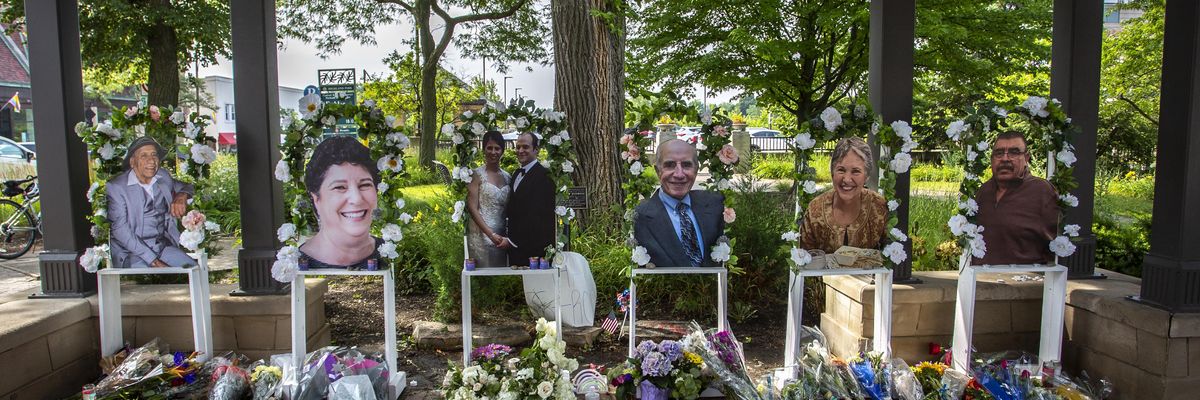Mass shootings, in a dark, dystopian way, are as American as apple pie. This was made painfully clear on July 4th in Highland Park, Illinois when a gunman opened fire on hundreds of people lining the streets for the Chicago suburb's annual Independence Day parade. When the shooting stopped, six people lay dead with close to 30 injured, one of whom later died in the hospital.
July 4th honors the day in 1776 when the thirteen colonies issued the Declaration of Independence. "We hold these truths to be self-evident," its preamble proclaimed, "that all men are created equal, that they are endowed by their Creator with certain unalienable Rights, that among these are Life, Liberty and the pursuit of Happiness." The Highland Park murder victims have neither life nor liberty, robbed of their happiness as the shooter fired at least 70 rounds into the crowd, using his legally-purchased semi-automatic rifle exactly as the AR-15's original designers intended, to kill human beings. The Second Amendment rights of the accused killer, recently expanded by the aggressively rightwing U.S. Supreme Court majority, irrevocably trumped the rights of his victims.
Six months before the Declaration in 1776, a pamphlet tore through the colonies like wildfire. "Common Sense," by a working-class English immigrant named Thomas Paine, argued in favor of overthrowing British rule in the thirteen colonies. Several hundred thousand copies circulated among the 2.5 million people there, generating a wellspring of support for revolution. Paine cited the battles of Lexington and Concord on April 19th, 1775 as the moment that ended the possibility of reconciliation with England. On that day, the mythologized "Minutemen," those American farmers who laid down their plows to take up arms, militarily retaliated against British soldiers for the first time, firing what Ralph Waldo Emerson called "the shot heard round the world."
By December of 1776, the Continental Army, commanded by George Washington, was on the run, fleeing a massive British onslaught. Thomas Paine, seeing morale flagging, wrote another pamphlet, "The American Crisis." He opened it with the lines, "These are the times that try men's souls. The summer soldier and the sunshine patriot will, in this crisis, shrink from the service of their country; but he that stands it now, deserves the love and thanks of man and woman." He's credited with providing vital inspiration to the revolutionary cause at its lowest point.
A dozen years later, 55 white men, almost half of whom enslaved people, drafted the U.S. Constitution. They included provisions protecting slavery (without mentioning it) as well as the Second Amendment, a grammatically ambiguous statement linking a "well regulated Militia" with the right to bear arms. In recent years, including last month, the Supreme Court has stretched the meaning of the Second Amendment, expanding the rights of individuals to own and carry guns with less and less regulation. This helps explain our current sorry state of affairs with 400 million guns in circulation and 100 deaths from gun violence DAILY.
The current Supreme Court majority fancies themselves "originalists," imposing their understanding of what the 18th-century founders were thinking. But "arms" back then were muskets, with each handmade bullet taking about a minute to load - a far cry from today's ubiquitous AR-15.
The right to bear arms, like so much in our country's bloody history, can be traced back to the violent institution of slavery, the suppression of slave revolts, and to the genocide against indigenous people.
"When you think about the Bill of Rights, you've got the right to freedom of the press, no state-sponsored religion, freedom of assembly, the right not to be illegally searched and seized, the right to a speedy and fair trial, the right not to have cruel and unusual punishment," Carol Anderson, author of "The Second: Race and Guns in a Fatally Unequal America," said on the Democracy Now! news hour. "Then you've got this well-regulated militia? The right to bear arms for the security of the state? That amendment is an outlier in this Bill of Rights...it was the payoff to the South to have a force under state control that could contain Black aspirations, Black freedom quests, that could contain what is seen as a dangerous Black population."
Carol Anderson's book, "The Second," should be required reading for any modern, self-styled "patriot" claiming unfettered gun rights.
As Thomas Paine wrote in The American Crisis,
"Let it be told to the future world, that in the depth of winter, when nothing but hope and virtue could survive, that the city and the country, alarmed at one common danger, came forth to meet and to repulse it."
Our uniquely American crisis of mass shootings and gun violence must be confronted with sustained, grassroots action, starting with an assault weapons ban.
